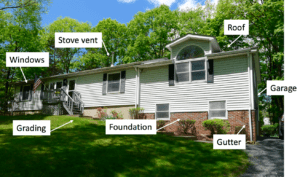Tip for Buyers – Inspection
You’ve been pre-approved, hired a buyer’s agent, developed a list of needs, house shopped and found the home of your dreams. You made an offer and your agent has just informed you that you and the seller are in agreement on the terms of the deal. The next step on the agenda is to get an inspection done. What is the house inspection all about?
Reasons for an inspection
Almost all buyers should get an inspection. Typically there are two main reasons why you might hire an inspector.
 The first is to make sure you know what you are purchasing. Specifically, you want to know if there are any major concerns you should be aware of, either now or in the future. What kind of maintenance budget will you need to set up? Are there items that should be fixed as soon as possible? What issues are observable by the inspector that you didn’t see during the showings? Something will need repair or attention at some point, and you will want to know what those items might be.
The first is to make sure you know what you are purchasing. Specifically, you want to know if there are any major concerns you should be aware of, either now or in the future. What kind of maintenance budget will you need to set up? Are there items that should be fixed as soon as possible? What issues are observable by the inspector that you didn’t see during the showings? Something will need repair or attention at some point, and you will want to know what those items might be.
The second is to decide whether you want to still purchase the home. If your offer is contingent upon a home inspection, you may decide there are just too many things that will need to be addressed. You might determine that because of that, you’d rather find a newer (or smaller, or different style) home.
What happens at the home inspection?
Not all inspectors work exactly the same. That being said, an inspection will typically take between an hour and a half to two hours. During that time, inspectors will do a complete review of the home, from top to bottom, and inside and out. Their job is to observe and document whether the home is in satisfactory condition, or whether there are issues that will need to be addressed. The following is not fully-inclusive, but is provided to give a sense of the breadth and depth of an inspection. Inspectors often check out the following.
 The roof. Are there any missing or damaged shingles? How old is the roof? How many years might be left? Is the flashing attached properly and in the right area? Are there any signs of leaks? Are there appropriate vents, rain caps, or anything else of interest?
The roof. Are there any missing or damaged shingles? How old is the roof? How many years might be left? Is the flashing attached properly and in the right area? Are there any signs of leaks? Are there appropriate vents, rain caps, or anything else of interest?
The grounds. Is the land graded away from or towards the home? Are there plants that are too close to the siding? Are roots growing into the foundation? Are there water issues of any kind? What kind of condition is the driveway in? Are there patios or paths, and if so, are there cracks or structural issues? Are decks and fences sturdy and structurally strong?
The exterior: Does the home have appropriate gutters? What is siding made of, and what condition is it in? The same question for windows, caulking, fascia, foundation as well as exterior equipment such as the air conditioning unit. Is there a chimney, and if so, is it in need of any servicing?
Heating/Air Conditioning. What kind of units are in the home, and how old are they? Do units that can be tested work correctly? As an aside, if it’s the middle of winter, the air conditioning cannot be tested and if in the middle of the summer, the same is true of the heat. Are the filters, piping, controls, venting, valves and other parts of the system all working properly?
Plumbing. The inspector may run water in faucets for a significant amount of time to ensure there are no leaks. They’ll check the parts of the plumbing system (water tank, pump, etc) to ensure they appear to be working properly. In addition, they will check to confirm that water pressure, flow and drainage are all appropriate.
Electrical Service. Inspectors will check outlets to ensure they are grounded properly. They will make sure GFCI outlets work as intended. They’ll check the electric box, remove the panel, and make sure there are no double taps, old wiring, spaces with no covers, or other issues.
Everything else: Inspectors may confirm that appliances that are staying with the home operate satisfactorily. They will check out the attic and basement for cracks, leaks, water damage, insulation, wiring, venting, and anything else that may be in evidence. They will test windows to ensure they open and seals are not broken. Inspectors will look at flooring, door frames, doors, ceilings, and anything else in the home to see if there are any items of concern.
In addition, you might also wish to get well water, septic, pest and radon inspections. The above is not an all-inclusive list but does provide some insight into what an inspector looks at when in your future home. It also helps explain why an inspection takes so long to complete!
With a day or two, you will receive a copy of the inspection report. Once you and your agent have reviewed the report, you should discuss next steps. You may decide to just move forward with the deal with no repair requests at all. You might also decide to request repairs, or a repair credit from the seller. Typically the items included in repair requests are those that are safety or structural related, not cosmetic items.
What kinds of repair requests might be made?
 Every single home sale is different, not only because every home is different, but because the same is true of all the people involved. There are some buyers who are so excited about the home, they are just going to move forward “as is”. There are others that will attempt to ask for everything under the sun to be repaired. And some others will only ask for things they feel are really critical in order to be able to live in a safe and comfortable environment.
Every single home sale is different, not only because every home is different, but because the same is true of all the people involved. There are some buyers who are so excited about the home, they are just going to move forward “as is”. There are others that will attempt to ask for everything under the sun to be repaired. And some others will only ask for things they feel are really critical in order to be able to live in a safe and comfortable environment.
To get an idea of what types of requests you might make, here is a list of some real-life requests that buyers have made in the past. Being included in this list does not mean they are necessarily the type of request you should make. But other buyers have made these requests. These are in no particular order.
- Repair, replace, or install GFCI outlets in the kitchen, bath, garage or laundry room.
- Add a handrail to stairs leading to an upper level.
- Hire a mold inspector to determine whether the growth in the attic is mold, and remediate if it is.
- Install a bumper guard in the garage in front of the boiler so the buyers won’t smash their car into the boiler if they drive into the garage while speaking on their phones.
- Repair the bathroom fan which is venting directly into the attic; ensure it is vented outside the house.
- Replace the rusty and leaking water tank that is in the basement.
- Repair the firedoor that goes into the garage; it needs to close automatically.
- Install a carbon monoxide detector.
- Replace the window that has a large hole in it.
- Treat and retest the well water; water test showed coliform and ecoli.
- Repair the outlets which had no ground or had open ground wires.
- Install a radon mitigation system; the radon results were over 4 pCi/L.
How might a seller respond to repair requests?
Sellers have several options in terms of responding to a list of repair requests.
- They can agree to repair all requests, or specific requests only.
- They can offer to reduce the price or make another financial concession to you in lieu of making the repairs.
- They can reject any requests, or specific requests only.
To provide a little more insight, here is how the above requests were responded to (again, these were real life requests).
- Repair, replace, or install GFCI outlets in the kitchen, bath, garage or laundry room. In almost every instance of this request, sellers have agreed to have the issues repaired. Some mortgage products will not allow the process to proceed without these repairs, and they could be safety issues for the new owners if not repaired.
- Add a handrail to stairs leading to an upper level. In this case, the stairs were dangerous without the handrail. The seller agreed to make the repair.
- Hire a mold inspector to determine whether the growth in the attic was mold, and remediate if it is. In this case, the seller decided not to agree to a mold inspection. Because of that, the buyer decided not to purchase this home, and the deal died.
- Install a bumper guard in the garage in front of the boiler so the buyers wouldn’t smash their car into the boiler if they drove into the garage on their phones. The seller said no. Vehemently. The deal went forward anyway and closed successfully.
- Repair the bathroom fan which was venting directly into the attic; ensure it vented outside the house. In one case, the seller agreed to make the repair. In the other, the seller said no but deal went forward anyway.
- Replace the rusty and leaking water tank that is in the basement. The seller said no, and the deal moved forward successfully.
- Repair the firedoor that goes into the garage; it needs to close automatically. The seller said yes. This also is a safety issue; all doors between the garage and home should close automatically.
- Install carbon monoxide detector. The seller said yes.
- Replace window that has a large hole in it. The seller said no but offered a small price reduction to enable the buyer to repair when they moved in. The buyer purchased the home.
- Please treat and retest the well water; water test showed coliform and e-coli. This has happened multiple times, and the sellers have always agreed to take care of the treating and retesting. Many mortgages will not close if there is no clean bill-of-health for the water. It is also a safety issue for the new buyers.
- Repair the outlets which have no ground or have open ground wires. Electrical issues can be safety problems, and in most instances (this is a common request), sellers will ensure the issues are corrected.
- Install a radon mitigation system; the radon results were over 4 pCi/L. This is also an issue that happens relatively frequently in my area. Sellers have agreed to this request, since any buyer who purchases the home will want this to be remedied.
Summary
Having an inspection can be a time of some concern for both sellers and buyers. For you, the buyer, you want to obtain a comfort level that the house you are purchasing will be safe and not require any major expenses in the short term. Some buyers would prefer not to spend the money required to get an inspection. I always advise that they go ahead and do so, since they should ensure their investment of many hundreds of thousands of dollars is worth pursuing.
Although every transaction is different, at a high level, items that could be safety or structural in nature do deserve to be addressed by the seller. Your buyer’s agent will help you work through whether there are items in the inspection report that are truly critical to repair. If there are, you will need to decide whether you will move forward with the purchase if they are not fixed. And then put together your repair request, and your agent will negotiate on your behalf. Once you have agreement, it’s time to move forward!
If you need any assistance purchasing a home in the Monroe NY area, feel free to call me at 914-419-0270 or email me at kat@thehousekat.com. My goal is to make buying a home as simple as possible.
For other buyer tips, click here.
Information previously published as a seller tip.